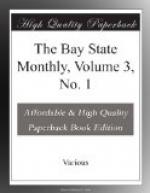But the court did not confine itself to prescribing the size of a lady’s sleeves, or the trimming she might wear on her dress: it passed other timely laws to restrain the idle and vicious and preserve good order throughout the community. It was ordered in 1632 “that y’e remainder of Mr. (John) Allen’s strong water, being estimated about two gallandes, shall be deliuered into y’e hands of y’e Deacons of Dorchester for the benefit of y’e poore there, for his selling of it dyvers tymes to such as were drunke by it, knowing thereof.”
In 1638 the court passed a curious law regulating the use of tobacco, which runs as follows:
“The Court finding since y’e repealing of y’e former laws against tobacco y’e law is more abused than before, it hath therefore ordered that no man shall take any tobacco in y’e field except in his iourney, or meale times, vpon pain of 12’d for every offence, nor shall take any tobacco in (or near) any dwelling house, barne, Corn or Haye, as may be likely to endanger y’e fireing thereof, vpon paine of 2’s for every offence, nor shall take any tobacco in any Inne or common victualling house; except in a private room there; so as neither the master of the same house nor any other gueste there shall take offence thereat; w’ch if they doo, then such p son is forth w’th to forebeare, vpon paine of 2’s 6’d for every offence.”
One office created by the court of that early period it might not be a bad idea for the authorities of the present day to revive. Wardens were appointed annually to “take care of and manage y’e affairs of y’e School; they shall see that both y’e Master & Schollar, perform, their duty, and Judge of and End any difference that may arrise between Master & Schollar, or their Parents, according to Sundry Rules & Directions,” set down for their guidance.
In all matters coming within the province and jurisdiction of the colonial church the law was even more exacting than in merely civil affairs; and singularly enough, the town authorities took it upon themselves to seat all persons who attended divine service in the meeting-house where it seemed to them most proper. With the full approbation of the selectmen, responsible persons were sometimes allowed to construct pews or seats for themselves and their families in the meeting-house; but it appears on one occasion that three citizens undertook to “make a seat in y’e meeting-house,” without first getting the full permission and consent of the town fathers, an act deemed exceedingly sinful, and for which they were arraigned before the town at a special meeting and publicly censured. After duly considering the case it was decided to allow the seat to remain, provided it should not be disposed of to any person but such as the town should approve of, and that the offending parties acknowledge their “too much forwardness,” in writing, which they did in the following manner:




